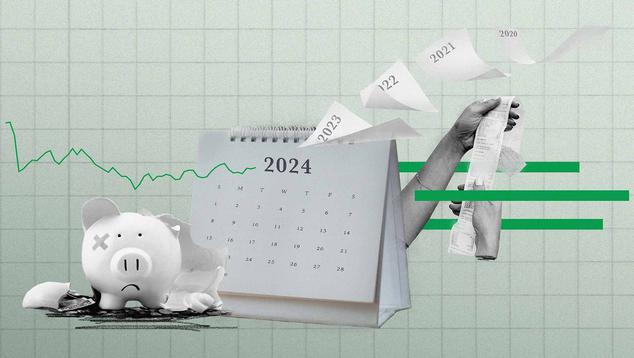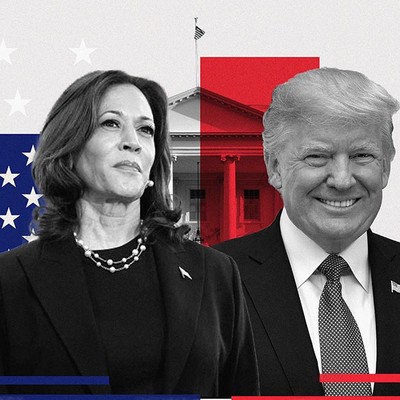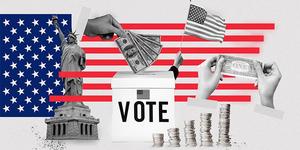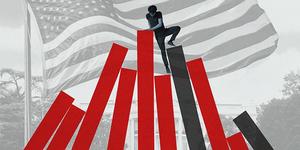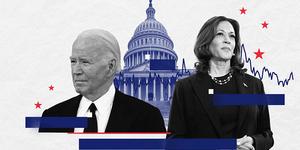WASHINGTON, D.C. -- More than half of Americans (52%) say they and their family are worse off today than they were four years ago, while 39% say they are better off and 9% volunteer that they are about the same. The 2024 response is most similar to 1992 among presidential election years in which Gallup has asked the question.
The latest findings are from a Sept. 16-28 poll, which also finds differences among partisans’ perceptions on this measure -- Democrats (72%) are much more likely than independents (35%) or Republicans (7%) to view themselves as “better off.”
The higher-than-usual percentage of U.S. adults who say they are worse off this year is largely owing to Republicans’ much greater likelihood to say this than opponents of the incumbent president’s party had been in prior election years. Likewise, the higher-than-usual percentage of “better off” responses in 2020, when Donald Trump was in office, was attributable to Republicans’ much greater likelihood to give that response than supporters of the incumbent president’s party did in prior election years.
Economic Confidence and Being “Better Off”
Americans’ perceptions of whether they are better off have been related, historically, to how they feel about the U.S. economy, as reflected in Gallup’s monthly Economic Confidence Index (ECI).
Gallup’s ECI summarizes Americans’ evaluations of current economic conditions (as excellent, good, only fair or poor) and their outlook for the economy (whether they believe it is getting better or worse).
The index has a theoretical range of +100 (if all Americans rate current conditions as excellent or good and say the economy is getting better) to -100 (if all Americans rate the economy as poor and say it is getting worse). In Gallup’s trend of these measures since 1992, the highest ECI score was +56 in January 2000, and the lowest was -72 in October 2008.
In 1992, a relatively low 38% of Americans said they were better off with the ECI at -37; and the incumbent, George H.W. Bush, lost. In 2004, when nearly half said they were better off and the ECI was +1, and George W. Bush won reelection. Similarly, 45% felt better off in 2012 when the ECI was -1, and Barack Obama won. Yet, in 2020, while 55% claimed to be better off and the ECI was -4, Trump lost his reelection bid -- a sign that noneconomic factors were paramount to voters that year.
Gallup’s latest measurement of Americans’ economic views, from an Oct. 1-12 poll, puts the ECI at -26 -- one of the worst election-year readings, along with the 39% “better off” reading from September.
America’s Economic Confidence Remains Low
The -26 ECI reading in October is essentially unchanged from September.
Over the past four years, Economic Confidence has largely been negative. In 2022, the index registered several scores that were among the worst since the 2007-2009 recession, as inflation reached levels not seen in four decades. During the past three years, Americans have named inflation as the most important financial problem facing their family. These findings suggest inflation likely underlies Americans’ perceptions that the economy is poor, even against a backdrop of generally low unemployment, steady economic growth, and record stock and housing values.
Forty-six percent of Americans describe current economic conditions as “poor” and 29% as “only fair,” while 25% say current conditions are “excellent” or “good.” Additionally, 62% say the economy is “getting worse” compared with 32% saying it is “getting better.” The latter figure has been the same since August, when Americans’ optimism jumped seven points.
43% Mention Economic Matters as Most Important Problem
Economic concerns figure prominently when Americans are asked to name the most important problem facing the U.S., with a total of 43% naming one or more economic issues, similar to September’s 44%. Economic mentions were last this high in October 2022, and had not been above the mid-40% range since May 2014.
The “economy” in general terms (21%) and inflation (14%) are two of the specific issues most commonly mentioned as the most important U.S. problem, along with immigration (21%) and the government (17%).
44% View U.S. Job Market Favorably
Gallup asks Americans quarterly for their assessments of the job market. Currently, 44% of U.S. adults say it is a good time to find a quality job, while 50% say it is a bad time.
This month’s “good time” percentage is essentially unchanged from the prior measure in August, but is lower than readings taken between August 2021 and April 2024.
September’s U.S. unemployment rate was 4.1%, similar to where it has been in recent months, below the historical average of 5.69% but higher than the record low of 3.4% registered in January and April 2023.
Bottom Line
Ronald Reagan famously asked in a 1980 presidential debate against then-incumbent President Jimmy Carter, "Are you better off than you were four years ago?" The question lingers as a standard by which each presidential administration is judged, particularly when incumbents are seeking reelection, and has been asked by Gallup in most presidential election years since 1992.
While there are different dimensions that build a “good” life, and these could make someone feel they are better off, the economy serves as a broad indicator of national health and directly impacts individuals' daily lives. Other research shows the relationship between the economy and personal wellbeing.
Historical trends suggest that perceptions of personal wellbeing and economic confidence can significantly impact election outcomes. With a majority of Americans feeling they are not better off than four years ago, economic confidence remaining low, and less than half of Americans saying now is a good time to find a quality job, the economy will be an important consideration at the ballot box this year. As inflation persists and economic concerns dominate voters' minds, the upcoming election may hinge on which candidate can best address these pressing issues.
To stay up to date with the latest Gallup News insights and updates, follow us on X @Gallup.
Learn more about how the Gallup Poll Social Series works.
View complete question responses and trends (PDF download).
